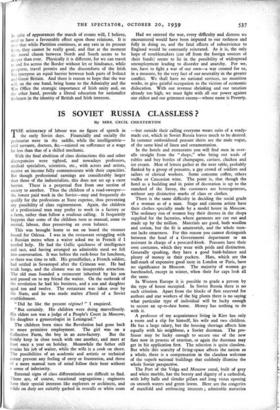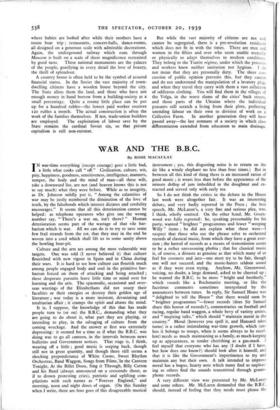IS SOVIET RUSSIA CLASSLESS?
By MRS. CECIL CHESTERTON
THE aristocracy of labour was no figure of speech in the early Soviet days. Financially and socially the proletariat were in the saddle, while the intelligentsia— civil servants, doctors, &c.—existed on sufferance at a wage far less than that of a skilled mechanic.
With the final abolition of class distinctions this and other discrepancies were righted, and nowadays professors, medical specialists, scientists, etc., with actors and artists, receive an income fully commensurate with their capacities. But though professional earnings are considerably larger than those of the industrialists, this does not set up a caste barrier. There is a perpetual flux from one section of society to another. Thus the children of a road-sweeper- the lowest paid work in the Soviet—may and frequently do qualify for the professions at State expense, thus preventing any possibility of class regimentaton. Again, the children of a professional man may prefer to work in a factory or a farm, rather than follow a studious calling. It frequently happens that some of the children turn to manual, some to mental, labour, thus preserving an even balance.
This was brought home to me on board the steamer bound for Odessa. I was in the restaurant struggling with a Russian menu when a waiter asked me in French if I needed help. He had the Gallic quickness of intelligence and tact, and having arranged an admirable meal we fell into conversation. It was before the rush-hour for luncheon, so there was time to talk. His grandfather, a French soldier, had settled in Sevastopol after the Crimean war. He had weak lungs, and the climate was an insuperable attraction. The old man founded a restaurant inherited by his son and passed on to my friend the waiter. On the outbreak of the revolution he had his business, and a son and daughter aged ten and twelve. The restaurant was taken over by the State, and he was made maitre d'hotel of a Soviet establishment.
"Did he like the present regime?" I enquired.
"But certainly. His children were doing marvellously. His eldest son was a judge of a People's Court in Moscow, his daughter a gynaecologist in Leningrad."
The children born since the Revolution had gone back to more primitive employment. The girl was on a Collective Farm, the boy in an auto-factory. But the family keep in close touch with one another, and meet at least once a year on holiday. Meanwhile the father still retains his job of waiter, while the wife is a cook on shore. The possibilities of an academic and artistic or technical career prevent any feeling of envy or frustration, and those of a more manual turn of mind follow their bent without a sense of inferiority.
External signs of class differentiation are difficult to find. There are, of course, vocational segregations ; engineers have their special interests like explorers or architects, and while on duty are suitably garbed in overalls or white coats —but outside their calling everyone wears suits of a ready- made cut, which in Soviet Russia leaves much to be desired. In summer embroidered peasant shirts are the male vogue, of the same kind of linen and ornamentation.
In the hotels and restaurants you will find men in over- alls straight from the "shops," who bring out wads of rubles and buy bottles of champagne, caviare, chicken and ice cream. Men of letters gather at the next table, probably flanked by a group of peasants, a gay crowd of soldiers and sailors or clerical workers. Some consume coffee, others vodka or Caucasian wine. The point is, that though the hotel as a building and in point of decoration is up to the standard of the Savoy, the customers are heterogeneous, without any distinctive marks of class or clothes.
There is the same difficulty in deciding the social grade of a woman as of a man. Stage and cinema artists have their clothes specially made by a model house in Moscow. The ordinary run of women buy their dresses in the shops supplied for the factories, where garments are cut out and made up by the million. Materials are good, both woollen and cotton, but the fit is amateurish, and the whole turn- out lacks smartness. For this reason you cannot distinguish between the head of a Government department or an assistant in charge of a postcard-kiosk. Peasants have their own costumes, which they wear with pride and distinction. Generally speaking, they have a good bank-balance and plenty of money in their pockets. Hats, which are the hall-mark of expensive good taste in London or Paris, have no significance in Moscow. The majority of women go bareheaded, except in winter, when their fur caps look all the same.
In Western Europe it is possible to grade a person by the type of house occupied. In Soviet Russia there is no such criterion. Apart from the blocks of flats reserved for authors and star workers of the big plants there is no saying what particular type of individual will be lucky enough to secure an up-to-date home. Money has nothing to do with it.
A professor of my acquaintance living in Kiev has only a room and a slip for himself, his wife and two children. He has a large salary, but the housing shortage affects him equally with his neighbour, a Soviet dustman. The pro- fessor may be lucky enough to secure one of the new flats now in process of erection, or again the dustman may get in his application first. The selection is quite classless. But while this scarcity of living-space affects the nation as a whole, there is a compensation in the classless welcome of the superb national buildings that suddenly illumine the whole Soviet perspective.
The Port of the Volga and Moscow canal, built of grey and white marble, has the beauty and dignity of a cathedral, with lofty halls and slender pillars and long vistas opening on smooth waters and green lawns. Here are the congeries of manifold and embracing interests ; admirable nurseries where babies are looked after while their mothers have a steam boat trip ; restaurants, concert-halls, "dance-rooms, all designed on a generous scale with admirable decorations. Again, the underground railway which runs through Moscow is built on a scale of sheer magnificence restrained by good taste. These national monuments are the palaces of the people, gratifying in every detail the love of beauty, the thrill of splendour.
A country house is often held to be the symbol of assured financial status. In the Soviet the vast majority of town- dwelling citizens have a wooden house beyond the city. The State allots them the land, and those who have not enough money in hand borrow from a building-society at a small percentage. Quite a roomy little place can be put up for a hundred rubles—the lowest paid worker receives 120 rubles a month. The actual construction is often the work of the families themselves. If not, trade-union builders are employed. The exploitation of labour save by the State remains the cardinal Soviet sin, so that private capitalism is still non-existent. But while the vast majority of citizens are not and cannot be segregated, there is a pre-revolution residuum which does not fit in with the times. There are men and women in the fifties and over who seem unable mentally or physically to adapt themselves to modern conditions. They belong to the Tsarist regime, under which the peasants and workers knew neither sanitation nor hygiene. I do not mean that they are personally dirty. The sheer con- cussion of public opinion prevents this, but they cannot and do not understand the manipulation of a lavatory plug, and when they travel they carry with them a vast collection of odiferous clothing. You will find them in the villages of the Volga, in the worst slums of the cities' back streets, and those parts of the Ukraine where the individual peasants still scratch a living from their plots, preferring unending labour on their own to division of work on a Collective Farm. In another generation they will have passed away—the last remnant of a society in which class differentiation extended from education to main drainage.













































 Previous page
Previous page